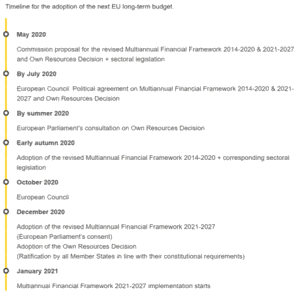Stay in the loop! Subscribe to our mailing list
On 27 May, the European Commission (EC) put forward a revised EUR 1.1 trillion EU budget for the 2021-2027 period. The EU budget powering the recovery plan for Europe includes a EUR750 billion recovery package to deal with the aftermath of the corona crisis, with the view to ensuring that the recovery will be sustainable, even, inclusive and fair for all Member States (MS).
The EC envisages a set of tools and measures with the three main aims:
1. support MS economies to recover from the crisis
2. boost private investment and support frail companies
3. reinforce key EU programmes to draw the lessons of the crisis and make the single market stronger and more resilient.
The proposed package consists of a combination of short-term mitigation measures, to deal with the immediate effects of the crisis, and support frameworks with a longer-term perspective towards (re)building socio-economic resilience without undermining the green and digital transitions. One-third of the recovery package is based on loan schemes that the MS would embark on as part of their National Reform Programmes, whereas the remaining EUR500 billion would be available through a range of grants and subsidies.
With a shift in priorities in light of the pandemic, the new proposal envisages less investment in cohesion, defense, research and administration, as compared to the 2018 baseline. The effects of this shift have resulted in decreased budgets for the Erasmus+ and Horizon2020 programmes, amongst others.
With less than a double of the previous programme budget, the proposed allocation for Erasmus+ now stands at EUR24.6 billion (2014-2020 Erasmus+ budget was EUR14.7 billion), to which the European Parliament (EP) reacted with strong disapproval. The Chair of the CULT Committee (European Parliament Committee on Culture and Education) as well as the rapporteurs for Erasmus+, Creative Europe and European Solidarity Corps, issued a statement in which they state that “…the specific figures for the education, culture and youth programmes are deeply disappointing and simply not in line with the statement by the Commission President on the importance of future generations, along with education and culture".
After an earlier standstill in the troika negotiations on the education, culture and youth programmes, it is to be seen whether this proposal, apart from the intended benefit for the EU-wide economic resilience building, has brought the EU policymakers any closer to agreeing on the programmes’ future in the coming months, as envisaged by the EU budget adoption timeline (see below).
